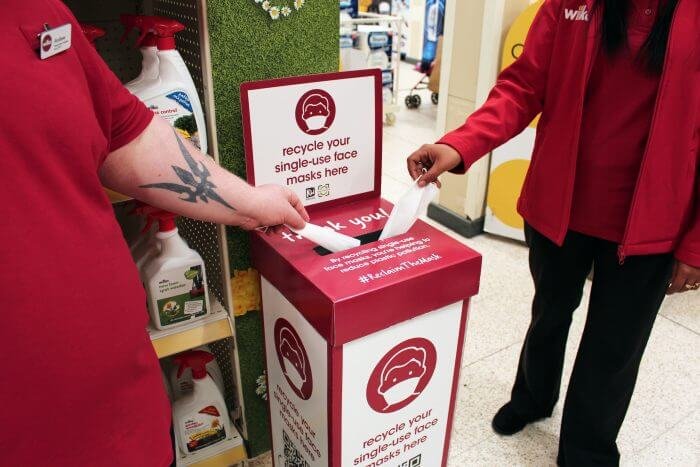COVID-19 - The Disease And The Propagator Of Waste
A year has passed since we wrote the “Waste Management” page of our environmental calendar and what a year it has been for everyone. Everything from how we spend our free time to what we wear has changed and evolved around a united thought. The coronavirus pandemic.
Throughout the pandemic there has been a massive increase in single use plastics. From countless lateral flow tests, to millions of disposable masks, not to mention the amount of PPE (Personal Protective Equipment) used in hospitals, dentists and GPs across the world. To limit the spread of the virus, most of this plastic waste has needed to be disposed of and now it is estimated that COVID waste could soon outnumber jellyfish in the Mediterranean Sea. So how do we limit our own COVID waste and what can we do about the waste we cannot control?
Since the 1950s the world has created over 6 billion tonnes of plastic waste with a shocking 91% that has never been recycled. Plastic waste has been shown to cause serious harm to the environment and has become a major global concern. There was more than 8 millions tonnes of pandemic-associated waste created in 2021, which has intensified the pressure on an already out-of-control problem.
Big oil industries have invested hundreds of billions of dollars into making new plastics for 2021’s ever increasing demand for face shields, gloves, takeaway food containers and packaging for online shopping. Most of this cannot be recycled and so landfill waste has surged. The pandemic has also intensified the price war between new and recycled plastic, in which the recyclers are losing. The economic slowdown has cut the price of fossil fuels and now the price of new plastics, “Virgin” plastics, can be half the price of the most common recycled plastics. According to the Independent Commodity Intelligence Services (ICIS), recycled plastic bottles can be 83-93% more expensive than new plastic bottles.
When the coronavirus pandemic started, cafes and coffee shops banned the use of reusable cups, increasing disposable cup production to 2.5 billion cups annually in the UK. However, in June 2021, more than 100 scientists published a signed statement reassuring the public to continue to use their reusable containers and so help reduce plastic pollution. Not only can you take a reusable coffee cup to your favourite café but many takeaway establishments will use your Tupperware if you ask them in advance!
© Image: Reworked face mask collection box
Masks are now compulsory in many aspects of our lives, they are commonplace to see when in restaurants, shops and in many other places. Approximately 3.4 billion single-use face masks/shields are discarded daily as a result of the coronavirus pandemic. This is a staggering figure which is reversing the global fight against plastic pollution and climate change. If you are required to use a single use face mask, please ensure that it is disposed of appropriately with the mask straps cut to reduce the risk of wildlife entanglement. If you live in the UK and near a Morrisons store, then you can now recycle your masks. A new initiative has seen the company Reworked team up with Morrisons and provide collection boxes in 483 of their stores. Face masks and other PPE is now being recycled in to a whole range of new products.
© Image: Reworked chair made from recycled PPE
Another new addition to our lives is the lateral flow home test kit. These come with a lot of non-recyclable plastics. Unfortunately the lateral flow test kits are not designed to recycle and there is so far little we can currently do to minimise this form of COVID waste.
Since the start of pandemic, we have seen shopping patterns significantly change. It started with people panic buying toilet rolls and queuing for miles to get into a supermarket, only to find more empty shelves. Many people have shifted their shopping patterns to only go to the supermarket once a week, or only when absolutely necessary. By doing a “big shop” and planning ahead there is a huge potential to cut household waste, money and time.
As an individual there is a lot that you can do to easily reduce your own COVID waste such as investing in a fabric mask (making sure you wash it regularly and it has a good fit), recycling masks and other PPE, shopping sustainably and locally once a week or whenever is absolutely necessary, and using reusable containers for all things takeaway.
At an industrial level it is much harder to reduce all forms of waste, especially COVID waste. We must all use and support recycling centres in order to restore, protect and even increase recycling services. Alongside reducing our food waste we must support food waste collection and treatment facilities. Overall we must start the transition towards a circular economy, which aims to recover resources to improve the efficiency of materials and waste systems and meet waste targets.
Waste management reduces the negative impact of waste on the environment, on human health and on wildlife. Without waste management we increase the risk of hazardous and harmful substances entering ecosystems. The additional pressure of the coronavirus pandemic has had a significant impact on the fight against pollution and without action we run the risk of reversing the work of many climate activists.
This blog accompanies our January entry on Waste Management on the Environmental Calendar. To read more about this and other environmental topics, please click the button below.



